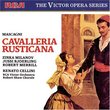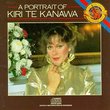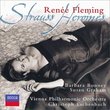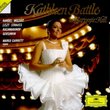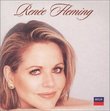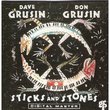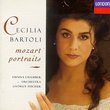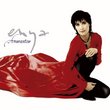| All Artists: Gaetano Donizetti, Richard Bonynge, Orchestra del Teatro Comunale di Bologna, Joan Sutherland, Huguette Tourangeau, Luciano Pavarotti, James Morris, Margreta Elkins, Roger Soyer Title: Donizetti - Maria Stuarda / Sutherland, Teatro Comunale di Bologna, Bonynge Members Wishing: 0 Total Copies: 0 Label: Decca (Universal) Release Date: 5/16/1990 Album Type: Import Genre: Classical Style: Opera & Classical Vocal Number of Discs: 2 SwapaCD Credits: 2 UPC: 028942541023 |
Search - Gaetano Donizetti, Richard Bonynge, Orchestra del Teatro Comunale di Bologna :: Donizetti - Maria Stuarda / Sutherland, Teatro Comunale di Bologna, Bonynge
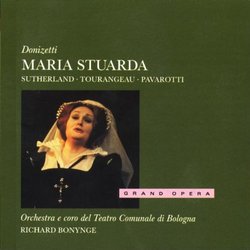 | Gaetano Donizetti, Richard Bonynge, Orchestra del Teatro Comunale di Bologna Donizetti - Maria Stuarda / Sutherland, Teatro Comunale di Bologna, Bonynge Genre: Classical
This opera becomes a battle of the divas in its great second act, with Sutherland, as Mary Stuart, pitted against the jealous, paranoid, and vengeful Elizabeth I (Tourangeau). There is an intensely dramatic confrontation i... more » |
Larger Image |
CD DetailsSynopsis
Amazon.com essential recording This opera becomes a battle of the divas in its great second act, with Sutherland, as Mary Stuart, pitted against the jealous, paranoid, and vengeful Elizabeth I (Tourangeau). There is an intensely dramatic confrontation in which insults are violently exchanged between the powerful monarch and her imprisoned but still regal rival to the throne. Mary wins the battle of insults, but this is a dangerous victory over one who has the power of life and death. Elizabeth orders Mary's execution and Act III becomes a spectacle of pathos and horror. Sutherland's usual style is more attuned to pathos than to the swapping of insults, but she rises splendidly to the challenges of Act II and she has a splendid supporting cast. --Joe McLellan Similarly Requested CDs
|
CD ReviewsSUTHERLAND IN TOP FORM VOCALLY AND DRAMATICALLY! Ygor | Brazil | 01/24/2005 (5 out of 5 stars) "Maria Stuarda is one of Donizetti's most dramatic operas, alongside with Lucrezia Borgia and Roberto Devereux. Once sung by gorgeous voices and effective singer actresses, it is the proof that Bel Canto is much more than beautiful melodies and difficult coloraturas. The roles of Maria and Elisabetta require not only remarkable voices, but above all great dramatic skills. Indeed, there's a natural dramatic power in all the masterpieces of Bel Canto, and it can be exciting when a singer like Callas, Sills or Sutherland brings the drama and pathos out of that amazing music! Joan Sutherland, being a real drammatico d'agilità soprano, has established herself as one of the best interpreters of Maria Stuarda. Her only rivals are Beverly Sills and Montserrat Caballé. However, both Sills and Caballé didn't have the powerful voice of La Stupenda. Instead of what some people declare about Sutherland's acting, she succeeds dramatically in all her most important roles. Being a sensitive and stylistically accurate actress, her acting conveys sentimentality and pathos rather than rage and tragic drama, but she can also be a fiery actress at the most intense moments. Here her diction is also very expressive, as she emphasizes every word to great dramatic effect. Just listen to her furious and sarcastic ''Vil bastarda!", which is enough to make her ''Figlia impura di Bolena" the most terrific on disc! Sutherland's voice had become darker and more expressive in 1975. Although it has gained a little more vibrato, there's little sign of the wobble it would acquire in few years. She shows off many qualities of her miraculous singing: the huge and exuberant sound, the ravishing high notes, the impeccable legato and even the much improved low register. Some highlights of her performance are the rock-solid high note she sings with Pavarotti in ''Se il mio cor tremò giammai", the incredibly long vocal line she keeps for 22 seconds in "Deh! tu di un umile preghiera" and the heartbreaking final scene. Luciano Pavarotti is at his peak, singing fantastic high notes with his beautiful bright voice. He also delivers and adequate characterization of Cecil. Actually, with that voice, even if he'd just stand and sing, this would still be a fascinating performance! In fact, the drama is centered on the two rival women, and Huguette Tourangeau does a great job as the Queen Elisabetta. She was kind of a second choice as a mezzo partner for Sutherland, being the first Marilyn Horne. Indeed, their voice blend extremely well, as we can hear in the Confrontation Scene. Her dark toned voice and wide range are ideal to sing Elisabetta, as it handles the difficult music written for the part with ease and conveys the vengeful personality of the role. This is one of Donizetti's most exciting operas, and it's sung by an ideal cast. Three of the most remarkable Bel Canto voices ever were joined in this recording. Besides, the moving music of Maria Stuarda is conducted with mastery and dramaticism. You can't miss this great opportunity to listen to some Golden Age singing at a mid-priced recording! You will be astonished!" Joanie gets upstaged! zhaow | 10/25/2004 (5 out of 5 stars) "what's odd about this opera is that for donizetti there is relatively little coloratura fireworks and there are not one but two leading ladies. in fact, torengeau, the mezzo who sings the part of queen elizabeth, upstages sutherland who sings the titular role. her dark timbre and dramatic singing make you sit up and take notice everytime she's on stage. joan, otoh, w/o her usual vocal acrobatics, is reduced to plain plaintive singing. this suits her voice and temperament well, and she makes a very sympathetic mary stewart. she even manages to throw in an uncharacteristic vitriolic outburst. but this is the queen's show. pavarotti is thrown in to triangulate the relationship and he's in good voice here. altogether a good opera and recording." Great Bel Canto Record! The Cultural Observer | 02/03/2005 (5 out of 5 stars) "Unlike Joan's famed Bonynge Lucia and her very dry Normas, this is a great record of Maria Stuarda! Joan Sutherland's portrayal of one of Donizetti's Queens amazes and stuns as she courses through the florid Donizettian bel canto lines with sheer ease and power rivaled only by Caballe and Beverly Sills. I do believe though, that this recording wins over Beverly's because of the size of her voice and her coloratura. Surprisingly, the drama she exudes here impresses me as well. Truly a great recording. Richard Bonynge conducts this finely, and Tourangeau and Pavarotti are great partners to La Stupenda. Don't miss this recording. If you want Joan Sutherland at her greatest, look for her earlier Donizettian recordings. For Bellini, I Puritani and La Sonnambula are good too, but don't go for Norma or her Verdi recordings. She is not very involved there."
|

 Track Listings (21) - Disc #1
Track Listings (21) - Disc #1
